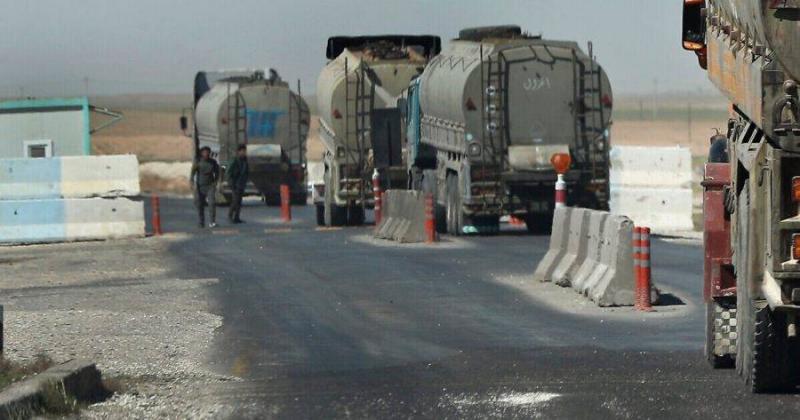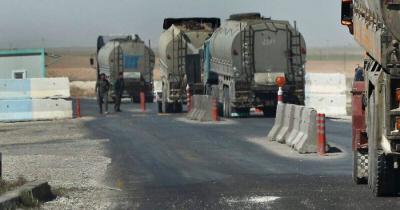Smuggling operations have regained momentum along the Lebanese-Syrian border villages in northeastern Lebanon, particularly via the Masnaa border crossing, with fuel leading the list of smuggled goods from Lebanon to Syria due to price disparities between Syrian territory and Lebanese villages. With the price of a 20-liter canister of gasoline in Syria reaching $46, and diesel at $38, prompted by high demand for fuels that are scarce in the Syrian markets due to American and European sanctions linked to the "Caesar" law, Lebanese smugglers have resumed their activities.
Field sources state that border areas with Syria, including the official Masnaa crossing point, have become significantly accessible to smugglers, extending from the Lebanese town of Sawiri in Western Bekaa to the Masnaa crossing and the border highlands, reaching the border towns in northeastern Lebanon. The increased smuggling activity has impacted Lebanese markets, not only in terms of heightened demand for gasoline and diesel but also in the rising demand for U.S. dollars from traders, importers, and companies, resulting in a spike in the exchange rate to around 47,000 Lebanese pounds last week before decreasing back to 46,000 pounds.
Notably in the eastern region, most fuel traders are small traders and motorcycle drivers who have engaged in smuggling operations across the borders, transporting valuable and rare fuels in the Syrian market due to material shortages and high demand in the black market, following the distribution based on vouchers for private and public vehicle owners. Field sources report that each motorcycle on smuggling routes at the Saqiyeh Jousiyeh crossing north of Hermel carries a load of four plastic containers, each with a capacity of 50 liters, totaling approximately 200 liters per smuggling trip, yielding a profit of $290 for a single daily trip between the Lebanese border and the villages in Syrian territory or southern Homs, given that the price of a gasoline canister in Lebanon is $18, while it is $46 in Syria. Meanwhile, the profit margin for diesel is lower, as the price of a diesel canister in Lebanon is $18 and in Syria is $38.
Motorcycles can navigate the dirt hills that were created on smuggling paths, which were closed by the Lebanese army last August to limit smuggling activities and the movement of tankers, trucks, and pickup transport vehicles, which find it challenging to maneuver between border points due to the closure of smuggling routes with earthen barriers.
The smuggling activity is not limited to northeastern Lebanon at illegal crossing points; the smuggling movement at the official Masnaa border crossing with Syria has also resumed, with smugglers transferring smuggled materials, including gasoline and diesel, in containers on foot. Many young individuals from the towns of Western Bekaa and Majdal Anjar have taken up smuggling as a profession, transporting fuel via crossed vehicles to Syria beyond the Lebanese customs point, emptying their tanks to sell at higher prices before completing their journey to Syria and returning to Lebanese territory.
In addition to fuel, smuggling operations for local cigarettes and other goods are active, with a noticeable increase in the smuggling of medicines and agricultural drugs from Syria to Lebanon due to price differences and the low cost of medicines in Syria.
The mayor of a village in the border region north of Hermel has confirmed the return of smuggling activity in a noticeable manner. He remarked, "Smuggling operations are conducted using motorcycles that cross the barriers and earthen barricades between Lebanese territory and Syrian territory at Saqiyeh Jousiyeh." He noted that smuggling operations, which were previously carried out by tankers, "are now completely halted due to the closure of the crossing points with earth barriers."
According to him, the prices of fuel, including gasoline and diesel, in Syria closely align with their prices in Lebanon when distributed based on vouchers designated for vehicle owners, but the needs of Lebanese individuals residing in the border villages have "increased smuggling operations; as Lebanese are not entitled to receive gasoline using vouchers designated for Syrians, these are solely distributed by the Syrian state to eligible recipients, which compels them (i.e., the Lebanese residing in Syria) to purchase gasoline and diesel from the black market," indicating that "smuggling does occur, but in limited quantities and in small containers."
Smuggling operations also involve gas due to the shortage of supplies in Syria, allowing each family head to receive one 10-kilogram subsidized gas cylinder every three months at the official price of 11,000 pounds. However, the price for a non-subsidized smuggled gas cylinder is sold in the black market for 220,000 Syrian pounds, equivalent to 1,750,000 Lebanese pounds ($37), which adds gas to the list of goods being smuggled by motorcycles and transport vehicles, despite the tightening of Syrian border guard forces around smuggling operations from Lebanese territory to the border villages in Syrian territory north of Hermel.




